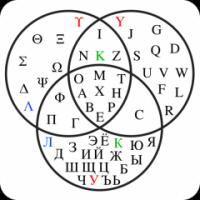შეტყობინებები: 29
ენა: English
matrix (მომხმარებლის პროფილი) 19 აპრილი, 2013 22:10:10
sudanglo:I would appear, from responses to my question in the Esperanto forums, that preni riskon is known to several European languages, in addition to English and French - Swedish, Turkish, Finnish, Spanish, Greek.“Ne prenu riskojn.” does work to me, in a literal way.
matrix (მომხმარებლის პროფილი) 19 აპრილი, 2013 22:32:18
Rugxdoma:Ne riskemu?“Ne riskemu.” could do it, too.
RiotNrrd (მომხმარებლის პროფილი) 20 აპრილი, 2013 00:48:56
sudanglo:Riot, 'preni' is just as much a francismo as an anglismo.Sure. It might be something found in other languages as well. My point had nothing to do with where it can be found generally, as that strikes me as irrelevant. I used "anglicism" because I don't speak French, and I gotta go with what I know*.
Is the expression also found in Navajo? Hindi? Cambodian? Nepalese? Aleut? Will it be easily understood by people whose native languages don't already sport a similar expression? Yes, probably. By some. But why translate it in a way that will, you know, probably be understood?
The fact that this is even a question kind of indicates the answer. If I were truly going for "international", I would tend towards something more direct.
A "risk" is not a thing that I can reach out to with my hands and pick up and run off with. "Take", in this case, is used in an abstract sense. Which is great if you are just sitting around shooting the breeze with your friends. I'm not saying "preni" is a bad word across the board, that it is inapplicable here, or even that a solid case can't be made for it conveying its intended meaning. All I'm really saying, I guess, is that for posted warnings maybe a more concrete expression is preferable to a more abstract one, just as a matter of broadly internationally-oriented style.
----------
* English.
Rugxdoma (მომხმარებლის პროფილი) 20 აპრილი, 2013 07:59:12
RiotNrrd: Or, thinking of it a different way, it has a kind of semi-idiomatic feel to it, even though it does seem possible to make a case for the usage. Kind of like some of the "make" expressions in English and German (make up, make off with, make out, etc.); some of them are solidly idiomatic - the individual words bear no relation at all to what the combination means - but some you can kind of make contrived explanations for. Preni, in this instance, strikes me similarly.I agree.
One way of testing if the expression "preni riskon" is an idiom or not is to check if the following expressions are meaningful and easily understood:
"ekhavi riskon", "havi riskon", "doni riskon", "perdi riskon", "ricevi riskon". If they are not, then people may start looking in the grammar for an explanation why there is a specific restriction for the object "riskon". For an abstract word like risk that is not an obvious fact, derivable from our experience.
To include such things in the grammars would make them big and inconvenient like German or Finnish school grammar books.
tommjames (მომხმარებლის პროფილი) 20 აპრილი, 2013 10:34:31
sudanglo:However Ne risku, I feel, doesn't quite come up to that. Without a preceding tem-estigo, it immediately raises the question ne risku what.I kind of agree, it feels that way a bit to me too. Though I think "ne risku" would generally be fine anyway. If the lack of an object feels strange in context then perhaps you could say "ne riskumu".
As for "preni riskojn", my first instinct would be to avoid it. Though I suppose the figurative use of "preni" is probably ok, particularly if that form is common to several European languages.
sudanglo (მომხმარებლის პროფილი) 20 აპრილი, 2013 10:47:35
Dejo (მომხმარებლის პროფილი) 20 აპრილი, 2013 10:50:25
erinja:"Ne risku" works because according to PIV "riski" can be used in an absolute sense, and they have a Zamenhof example: (abs) kiu ne riskas, tiu ne gajnasZ.
I'd say "Ne risku!"
Riski is transitive but I think that "ne risku" works, just like "ne manĝu" works (even though "manĝi" is, of course, also transitive).
RiotNrrd (მომხმარებლის პროფილი) 20 აპრილი, 2013 18:00:50
tommjames:If the lack of an object feels strange in context then perhaps you could say "ne riskumu".I like "ne riskumu", which didn't occur to me at all, better than my own suggestion. It seems to fully and concisely convey the desired intent.
"Don't do the risk thing". There's not a lot of ways you can read that.
sudanglo (მომხმარებლის პროფილი) 20 აპრილი, 2013 21:07:56
Kion fari se vi rimarkas ekbrulon.
1. Sonorigu la alarmilon.
2. Kontaktu la fajro-brigadon (tel.999)
3. Kiel eble ataku la fajron per la provizitaj estingiloj.
Se vi aŭdas la fajro-alarmon.
4. Direktu vin al la plej proksima elirejo.
5. Malhelpu disvastiĝon de la incendio per eventuala fermo de pordoj.
6. Forlasu la konstruaĵon kaj atendu je la ekstera kunven-punkto (Abbot’s Hill)
Ne panikiĝu, ne endanĝerigu vin per riska konduto, kaj ne re-eniru la konstruaĵon por kiu ajn celo sen permeso de incendi-profesiulo




